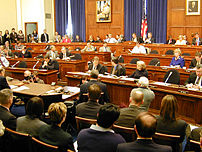
 US House Financial Services Committee.
US House Financial Services Committee.Image via WikipediaGovernment reform orgs. deliver news on major events within their areas of expertise.
From: MAPLight.org
MAPLight.org's new 'Committee Tool' tracks the river of money that flows through all bills in committee in US Congress
Web 2.0 Government Transparency Tool Reveals Campaign Contributions Given To All Committee Members, Saves Journalists and Citizen Activists Hours of Research
Berkeley, CA, Sep 18- Congressional Committees play a primary role in our political process—developing legislation and performing oversight. These legislative bodies have proven to be effective targets for big money interests. MAPLight.org's 'Committee Tool' provides a much needed window into special interest influence, revealing campaign contributions received by each Committee member from special interest groups for key bills placed before every Congressional Committee. This new government transparency tool provides journalists and active citizens with hard data to identify when big money interests seek to use campaign contributions to gain access and influence legislation while it is in Committee.
"This new level of government transparency hones in on the role big-money interests play in our political process," said Daniel Newman, MAPLight.org's executive director. "Who is more likely to get the ear of Committee members: A giant credit card company, which gives millions of dollars in campaign contributions, or a college student moonlighting to pay down credit card debt? A nuclear waste processing company, which gives hundreds of thousands of dollars in campaign contributions, or a concerned citizen in Utah worried about 20,000 tons of radioactive waste being dumped in their state?"
[...]MAPLight.org’s research department reveals how contributions correlate with legislation so that citizens have key information needed to draw their own conclusions about how campaign contributions affect policy. Campaign contributions are only one factor affecting legislator behavior. The correlations we highlight between industry and union giving and legislative outcomes do not show that one caused the other, and we do not make this claim. We do make the claim, however, that campaign contributions bias our legislative system. Simply put, candidates who take positions contrary to industry interests are unlikely to receive industry funds and thus have fewer resources for their election campaigns than those whose votes favor industry interests.
[Original press release has examples]
>All Things Reform Mobile: allthingsreform.mofuse.mobi >Capitol Switchboard: 202-224-3121 (not toll-free) >US House/Senate Mobile: bit.ly/members >Contact your reps tips: bit.ly/dear >Shortened All Things Reform URL: bit.ly/dw
![Reblog this post [with Zemanta]](http://img.zemanta.com/reblog_a.png?x-id=ce10930d-498c-4db0-a9c4-f4c9ee39a428)